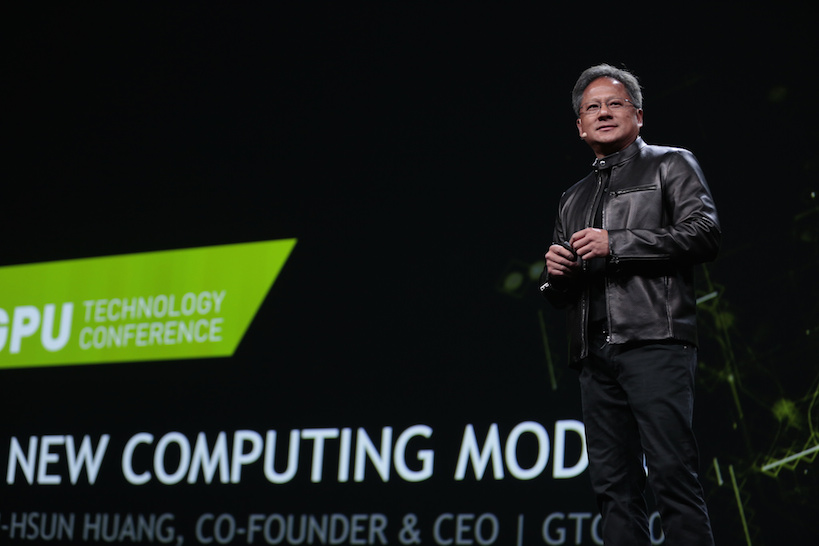 NEWS
NEWS
 NEWS
NEWS
 NEWS
NEWS
Nvidia became famous for its graphics processing unit chips that power some of the hottest gaming personal computers. Today, Chief Executive Jen-Hsun Huang signaled that he’s aiming even higher in a bid to reinvent the data center and cloud computing.
The company announced a new chip and a new computers both focused on artificial intelligence, in particular the fast-rising branch called deep learning that attempts to mimic the activity on layers of neurons in the brain. The technology is the basis for recent breakthroughs in speech and image recognition, self-driving cars and other technology-driven products and services.
“Our company has gone all-in on deep learning,” Huang said at the Apr. 5 opening of its annual GPU Technology Conference in San Jose, where he made the announcements. “We think this is going to utterly change computing. This is a brand new computing model.”
For one, the company announced what is essentially its first non-gaming chip, intended to accelerate the processing of massive amounts of data needed to make deep learning work its magic. The result of about $2 billion in research and development spending, it has 150 billion transistors on a single chip module, 15 billion of them for the processor, the rest for memory–making it the world’s largest chip, according to Nvidia.
Named the Tesla P100, it is now in high-volume production and will start shipping soon to customers. Initially those customers will be cloud computing leaders such as Amazon Web Services and Google. Early next year, they will appear in computer servers from IBM, HPE, Dell and Cray.
Nvidia also debuted what it called the world’s first deep learning supercomputer. The DGX-1 uses eight of the new Tesla chips to provide 12 times the performance of the Nvidia computer announced a year ago, and as much as 250 times the speed of a traditional server using dual Intel Xeon chips. Costing $129,000, the machine will ship first to AI researchers at the University of California at Berkeley, Stanford University, the Massachusetts Institute of Technology, and other universities starting in June.
Both the chip and the computer are aimed squarely at deep learning. Huang said deep learning will be the basis for the entire computer industry, including data centers and the cloud, for years to come. In recent years, Nvidia has focused on AI in addition to its gaming roots, but this is Huang’s biggest bet on AI yet, one that he says has “democratized deep learning.”
“Deep learning’s going to be in every industry; deep learning’s going to be in every application,” said Huang, who noted that the relatively new business is already Nvidia’s fastest-growing. “Our strategy is to accelerate deep learning everywhere.”
Huang also said he believes AI and deep learning will transform data centers and cloud services. “All of these services are now part of a cloud platform,” he said. “Cloud platforms in the future are going to be powered by AI.”
Rajat Monga, a Google technical lead and manager of TensorFlow, an open source software library for machine learning that was developed at Google, said the company thinks deep learning will infuse every Google service, including new areas such as robotics. The new Nvidia technology, he said, would help that happen faster.
Bryan Catanzaro, a former Nvidia researcher who joined the Chinese Internet giant Baidu in 2014 as a senior researcher, said he expects the technology, including the Pascal GPU design used in the new chip, to help Baidu “churn through more data and more quickly.” That should help further improve services such as speech recognition, he said.
At the conference, Huang also highlighted Nvidia’s continuing focus on virtual reality and autonomous cars. In VR headsets ranging from Facebook’s high-end Oculus to Google’s cheap Cardboard, Huang envisions the rise of a new platform for consumer computing. “VR’s going to transform communications,” he said. Nvidia announced a new “Iray” VR technology intended to create photo-real imagery.
Apple cofounder Steve Wozniak appeared via a web conference to try out new VR experiences such as a tour of Mars called Mars 2030 due out later this year. He has said he would sign up for a one-way trip to Mars, but added, “Before we get there, I want to experience it in VR.” After donning a headset and trying it out on-screen, he admitted, “I’m getting dizzy, I’m going to fall out of this chair,” to which Huang replied, “Well, Woz, that was not a helpful comment. I’ll let you know when I want you to help me again.”
Not least, Huang talked up the potential of Nvidia’s technology for connected cars and self-driving vehicles. Not surprisingly, he announced yet another new product, the Nvidia PX. It’s what he called the world’s first car computing platform powered by deep learning. The car computer is intended for use in everything from mapping systems to fully autonomous driving.
Support our mission to keep content open and free by engaging with theCUBE community. Join theCUBE’s Alumni Trust Network, where technology leaders connect, share intelligence and create opportunities.
Founded by tech visionaries John Furrier and Dave Vellante, SiliconANGLE Media has built a dynamic ecosystem of industry-leading digital media brands that reach 15+ million elite tech professionals. Our new proprietary theCUBE AI Video Cloud is breaking ground in audience interaction, leveraging theCUBEai.com neural network to help technology companies make data-driven decisions and stay at the forefront of industry conversations.